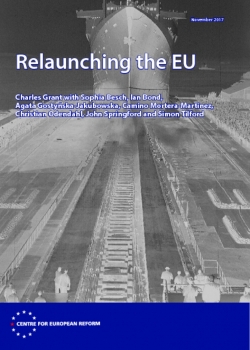
Relaunching the EU
The time is ripe for EU reform. The Union has weathered the worst of its multiple crises – on the eurozone, migration and refugees, and Brexit – while economic growth has picked up. Emmanuel Macron has emerged as a strong leader alongside a re-elected Angela Merkel. Now is the time to revamp the EU so that it improves its economic performance, provides more security and tackles some of the issues that matter to citizens. This report looks first at the need for new policies, and then at the EU’s structures and institutions.
We examine the interlinked challenges of the neighbourhood policy, migrant flows, the Schengen border and internal security. We suggest how the EU could play a more effective role in tackling the root causes of migration, handling the refugees who arrive in Europe and thwarting terrorists. For example, the EU should work more closely with the source countries of migrants, offering bigger incentives for them to hold on to and take back their people. It should lay the groundwork for setting up reception centres outside the EU where legitimate claims for asylum can be processed, and it will need a workable scheme for distributing those granted the right to enter. The EU should also join up its main security databases so that it can better police its asylum system and keep track of potential terrorists and other criminals.
We then turn to eurozone governance. Despite the eurozone’s improving performance, problems persist, such as high levels of debt and unemployment in some countries, and divergent economic performance. The answer need not be the large-scale centralisation of economic decision-making in EU or eurozone institutions. But important incremental changes are needed, such as strengthening the banking union; amending the European Central Bank’s mandate; and building a framework to ensure stable growth of aggregate demand in the eurozone as a whole. The EU should leave most economic policies to member-states, except when their consequences adversely affect others in the currency union, as is the case for Germany’s current account surplus and the non-performing loans of Italy’s banks.
We argue that the EU would have a greater appeal to citizens, especially the young, if it became more involved in several specific areas:
- Ensuring that EU member-states respect the rule of law;
- Combating the corruption that plagues some member-states;
- Establishing rules to prevent large multinational firms avoiding tax;
- Making it easier for workers to move around within the EU; and
- Encouraging investment in renewables and the green economy.
The report then looks at the future shape of the EU. There are competing visions: Jean-Claude Juncker wants to see every member take part in every policy, while Emmanuel Macron has suggested several tiers of membership. Given the differing preferences and objectives of the 27, Macron’s more flexible model is more viable in the long term. It would also enable the EU to revive the stalled enlargement process, by offering ‘membership minus’ to suitable countries. As for the neighbourhood policy, which has so far failed to create a ‘ring of friends’ around the EU, Brussels needs to increase its offer – for example by asking some neighbours to join particular policies. Britain could one day envisage rejoining the outer tiers of a more differentiated EU.
The EU cannot feasibly undertake a major revision of its treaties in the foreseeable future. But it should be able to fix the euro’s problems with new inter-governmental treaties, just for eurozone members. As for the EU’s institutions, the European Commission has lost the trust of some governments because of the perception that it is increasingly dependent on the European Parliament. It should return to an equidistant position between the Council of Ministers and the Parliament. National parliaments should play a greater role in EU governance. It is time to transcend the traditional battle between communautaire and inter-governmental thinking. The EU cannot succeed without both federal institutions and a major role for governments; they must work together.
Charles Grant is director of the Centre for European Reform, the other authors are all researchers at the CER.
View press release here.
The CER has produced a podcast mini-series, where the CER researchers explain some of the main recommendations in 'Relaunching the EU', listen here.

